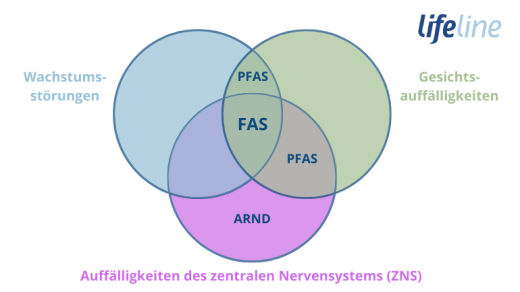Even small amounts of alcohol during pregnancy can lead to permanent physical and mental development disorders in newborns. Fetal alcohol syndrome (FAS) is a particularly serious consequence. More on symptoms and effects.
- © Getty Images/Nemer-T
Brief overview: FAS
What is the FAS? Fetal Alcohol Syndrome is a congenital disorder resulting from the mother drinking alcohol during pregnancy. It leads to lifelong physical and mental damage as well as to behavioral problems.
Symptoms: Alcohol affects the development of all organs and can lead to disorders of the central nervous system, growth disorders, malformations and behavioral problems. Especially in small children, characteristic changes in the face, such as a very narrow upper lip or a shortened eyelid gap, are usually recognizable.
Prevention: To prevent fetal alcohol syndrome, pregnant women should avoid alcohol throughout their pregnancy.
Article content at a glance:
What is Fetal Alcohol Syndrome?
Fetal alcohol syndrome (FAS), also known as alcohol embryopathy, is the most severe form of fetal alcohol spectrum disorder (FASD). The term FASD describes prenatal damage to the child that can be attributed to the mother’s alcohol consumption during pregnancy. One speaks of FAS when growth disorders, malformations such as facial deformities and disorders of the central nervous system are detected in the child.
Frequency of Fetal Alcohol Spectrum Disorders
It is estimated that more than 10,000 children with fetal alcohol spectrum disorders are born in Germany every year. About 3,000 of them have full screen (FAS). However, a high number of unreported cases is assumed. According to studies, around 20 percent of all women consume moderate amounts of alcohol during pregnancy, and 8 percent even consume larger amounts.
Fetal Alcohol Syndrome: Symptoms of FAS
Typical features of Fetal Alcohol Syndrome are:
Growth disorders: short height, underweight/low birth weight, physical deformities How Heart defects, kidney malformations, skeletal malformations
facial abnormalities: short lid fissure of the eye, a streaked vertical groove between the nose and upper lip (philtrum), narrow upper lip, small head circumference (microcephaly)
Central nervous system (CNS) abnormalities: Intellectual disability, epilepsy, attention deficit hyperactivity disorder (ADHD), behavioral problems (irritability, anxiety), language and motor skills difficulties, reduced learning and memory ability, attachment disorders
Not all symptoms are visible immediately after birth. Motor abnormalities or developmental delays can appear much more prominent in adolescence and adulthood, while growth disorders or facial changes change with advancing age and are less noticeable.
Forms of Fetal Alcohol Spectrum Disorders
Only a small proportion of all alcohol-damaged people develop the full picture of a classic FAS. Depending on the severity of the symptoms, specialists distinguish between different forms:
pFAS: Partial Fetal Alcohol Syndrome is a partial disorder. Facial abnormalities are less pronounced than in the full development and there are no growth disorders.
ARND (Alcohol-Related Neurodevelopmental Disorders): In alcohol-related neurodevelopmental disorders, only disorders of the central nervous system are observed after the mother has confirmed alcohol consumption – there are no physical signs.
ARBD (Alcohol Related Birth Defects): Malformations of the organs and/or bones are present as a direct result of documented alcohol consumption.
-

© Lifeline
Diagnosis of Fetal Alcohol Syndrome
Significant abnormalities in the newborn can indicate fetal alcohol syndrome immediately after birth. The diagnosis is then often made as part of the regular check-ups by the pediatrician.
An important criterion for the diagnosis is proven exposure to alcohol during pregnancy. However, this is often not known, since many women remain silent about their alcohol consumption for fear of stigmatization or are not asked about it. If this is the case, at least two of the following criteria must be met to make the diagnosis:
- growth disorder of the child
- Central nervous system disorder
- characteristic facial changes
-

How parents can tell if their child’s hyperactivity or lack of concentration are normal or already signs of ADHD.
to the ADHD test
In the medical practice, the height and head circumference of the child are measured, among other things. In addition, neurological and psychological tests serve to confirm the diagnosis. Precisely when there are no visible external characteristics, misdiagnoses such as attention deficit hyperactivity disorder (ADHD) are often made.
Prevent FAS: No alcohol during pregnancy
Every drop is harmful: During pregnancy, women should avoid alcohol altogether. The mother and her child are connected to each other via the umbilical cord and the placenta. After a short time, the baby therefore has the same alcohol level as the mother. However, its organs are still developing and the child is not able to break down the cell toxin quickly. The toxins mainly affect the baby’s brain and can lead to pathological and permanent damage even before birth.
The risk of the child suffering alcohol-related harm varies greatly and depends on various factors, such as:
- amount of alcohol
- Timing (particularly high risk in the first two trimesters)
- maternal age and health
Important: There is no amount of drinking that can be considered safe. Even low consumption and occasional excessive drinking can result in health problems for the child.
Fetal alcohol syndrome: what are the treatment options?
There are no causal treatment options for FAS. Brain damage in children cannot be reversed. Nevertheless, an early diagnosis is important in order to minimize the damage caused by appropriate support measures. The intensive cooperation between pedagogical, psychological and physiotherapeutic experts has proven to be particularly helpful. If necessary, the expertise of other professional groups such as speech therapists can also be used.
Medications are only needed if children with FAS have other conditions, such as epilepsy. Many of those affected need care and help throughout their lives.
Help for pregnant women, relatives and those affected by FASD
Women trying to have children or who are pregnant and having trouble stopping alcohol should seek medical help. There is no reason to be ashamed of admitting a possible weakness. On the contrary: women can receive support at an early stage without harming their child. Special advice for pregnant women who consume nicotine or alcohol is available anonymously and free of charge on the IRIS online platform: www.iris-plattform.de.
Relatives of children with FASD and people who are affected themselves can find regional contact persons, self-help groups and many other offers of help at the association FASD Deutschland eV. The supportive therapy options for improving the quality of life are also presented here – these include, for example, physiotherapy, speech therapy (speech therapy), behavioral or movement therapy and drug treatments: www.fasd-deutschland.de.


